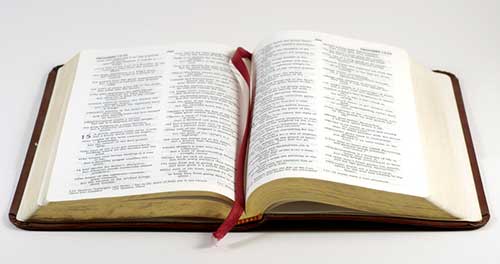Lent can be a time when we experiment with different types of praying, and also rediscover ways we have tried praying in the past, and take them up once again.
The Slow Food movement is the opposite of Fast Food. Slow food is about taking a little bit of food and enjoying it, appreciating it, relishing it. Slowly.
This is one way of thinking about this way of using the Bible in prayer. The method has a Latin name: Lectio Divina – divine reading.
You choose a short piece of the Bible that already speaks to you, or that you think may speak to you. And then you treat it like slow food. Because this small piece of the Bible is going to nourish you.
In Slow Food you do four things. You take a bite, a small bite. Secondly you chew. A lot. Then you savour the flavours. Fourthly you digest this food, and it becomes part of you. Bite; chew; savour; digest.
Biting off the small piece of scripture is called Lectio – reading. You read a small piece out of the Bible. Slowly. If you struggle to read slowly – choose a Bible in another language you know to slow you down. You can read it out loud to yourself. You can read the short passage over and over.
Then you chew this passage over. That’s called Meditatio – meditation, reflection. You think about the passage. You can use your imagination. You can make connections with your life. You can place yourself in the scene. You can reflect on other connected Bible passages you know; and so on. Chew. Chew. Chew.
Thirdly you savour the essence of it. Oratio. Oratio literally means prayer. You can talk to God about the passage. Honestly. Joy, anger, a request, a hope, doubt, a disappointment; whatever arises – you can address God about it. No one else is listening. You can be totally honest, and open.
Finally you digest. It becomes part of your body. It becomes part of you. That’s called Conemplatio – contemplation. This part of the Bible is no longer just another pile of words. Out there. This Word has become flesh in you. You can carry these few words around with you for the rest of the day, the rest of the week, the rest of your life. You are now putting these words into action in your life.
Slow food. Lectio Divina. Bite; chew; savour; digest. Lectio; meditation; oratio; contemplatio.
Read more about Lectio Divina.




Thanks for this, Bosco. I was taught a similar 4-stage process of lectio divina, in which we read the passage slowly four times, and pondering a different question after each reading:
1. What jumped out at you?
2. What is the most important thing?
3. What is God saying to you?
4. What is God saying to the Church?
I have found it amazing how I naturally find a different answer for every question. (This is a great way to kick-start a homily — if done well in advance when you’re not anxious for ideas!)
But it’s also excellent for use in a group. One person reads the passage, and then, after a period of silent reflection, you go round and find out how everyone answered the question under consideration.
Yes, Jesse, I have regularly used this type of way of relating to the Bible, similar to what you describe, in a group. Blessings.
Completely unrelated but, Sir, do us all a favour, never stop with your posts, research and Ministry. Everything i have ever read has inspired and blessed my journey. May G-d bless you and all those you hold dear.
Your encouragement, George, is much appreciated. Blessings.
I really enjoyed this article. I miss doing lecto. It’s a wonderful group exercise. Thanks for reminding me of how much I need to begin again.
Thanks for your encouragement, Bette. Blessings.